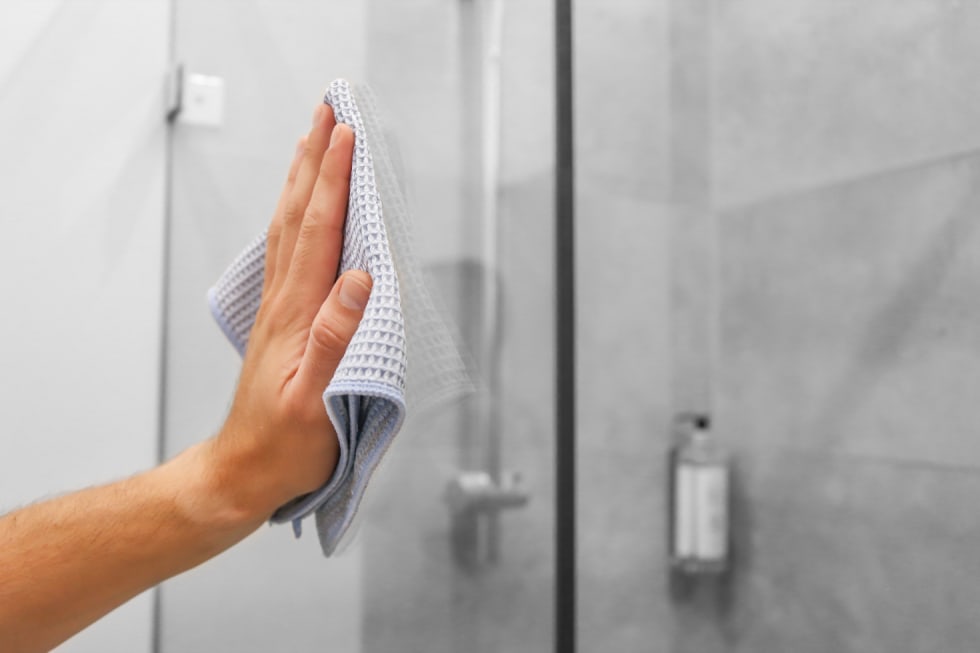The Ultimate Guide to Sharing a Shower with Roommates
Introduction
Ever found yourself timing showers to avoid awkward encounters while sharing a shower? You’re not alone. With over 30% of adults in urban areas now embracing shared living situations in apartments and condos, the dynamics of communal living are more relevant than ever.
In this guide, we’ll provide some tips and strategies designed to navigate the shared bathroom terrain with grace, from crafting a foolproof cleaning schedule to safeguarding personal space and privacy.
The Basics of Sharing a Shower
Navigating the shared bathroom waters requires more than just a good attitude, it demands a solid game plan for hygiene. In a shared setup, the humble shower sandal becomes a knight in rubber armor, guarding against the dragon of foot infections like athlete’s foot. Sharing a shower means sharing the space with all kinds of microscopic critters, making it imperative to protect your feet from unwanted guests.
When it comes to choosing the right gear, not all shower sandals are created equal. Brands like Adidas, Nike, and Crocs offer durable options designed to withstand wet conditions and provide the necessary grip to avoid slips.

Maintaining Hygiene in a Shared Shower
The cornerstone of a clean shared bathroom is a well-communicated and consistently followed cleaning schedule. If you’re renting a house with others, agreeing on who cleans what and when can prevent the buildup of soap scum, mildew, and other unwelcome guests in your shared space. Plus, it ensures that no one roommate is burdened with the responsibility more than others.
Here are a few of our recommended cleaning products for shared showers:
- Clorox Disinfecting Bathroom Cleaner: A powerhouse against germs, making quick work of soap scum and hard water stains.
- Method Antibac Bathroom Cleaner: For those who prefer a less harsh scent, this cleaner uses citric acid to kill bacteria and viruses.
- Scrubbing Bubbles Mega Shower Foamer: This product’s wide spray coverage makes cleaning large shower areas a breeze.
- Lysol Bathroom Cleaner Spray: Lysol is a go-to for disinfecting and leaves a fresh, clean scent behind.
- Seventh Generation Tub & Tile Cleaner: An eco-friendly option that doesn’t skimp on power, perfect for those looking to reduce their chemical footprint.
For the eco-conscious among us, DIY or natural cleaning solutions can be just as effective as their store-bought counterparts. Mixing equal parts of vinegar and water creates a natural cleaning solution perfect for tackling grime and soap scum without the use of harsh chemicals.
Ensuring Privacy and Scheduling
With roommates all vying for their turn, it’s no surprise that privacy and scheduling become hot topics. Thankfully, we live in an era where technology can lend a helping hand. Apps like Google Calendar and Trello have become indispensable tools for roommates to choreograph their bathroom routines with ease. By setting up a shared digital calendar, each person can block out their shower times, ensuring everyone’s routine starts on the right note without stepping on each other’s toes.
But what about privacy? Establishing scheduled shower times should also be respecting each person’s need for space. Whether you’re an early riser or a night owl, coordinating shower times means you can enjoy your privacy without disrupting the flow of the household. Remember, clear communication and setting boundaries are key to avoiding those all-too-familiar bathroom door knocks when you’re just trying to have a moment of peace.
Of course, life is unpredictable, and being rigid about schedules can lead to unnecessary tension. Whether it’s swapping shower times to accommodate a roommate’s job interview or adjusting your routine for a special occasion, showing a little flexibility can go a long way in fostering a positive living environment.

Handling Unhygienic Roommates
Addressing hygiene issues without stepping on toes requires a blend of empathy, clear communication, and sometimes, a little bit of creative problem-solving. Here’s how to tackle the challenge with finesse.
Strategies for Addressing Hygiene Issues with Empathy
Nobody likes to be told they’re falling short, especially on something as personal as hygiene. When broaching the subject, pick a neutral time and place, avoiding any moments directly after someone has used the bathroom. Begin with positive affirmations or shared goals for the living space, then express your concerns using “I” statements to avoid placing blame. For example, “I’ve noticed the shower gets quite slippery. Maybe we could look into a cleaning schedule?”
Creating a Roommate Agreement for Bathroom Cleanliness
A roommate agreement can be a powerful tool in maintaining bathroom cleanliness. Consider detailing the essential components in a well-formatted document, such as:
- A Cleaning Schedule: Including who cleans what and when ensures that responsibilities are evenly distributed.
- Shared Supplies List: Detail which supplies will be used, by whom, and how costs are shared.
- Personal Storage Guidelines: To avoid clutter, outline where personal items should be stored.
- Resolution Procedures: Define clear steps for addressing and resolving any cleanliness concerns.
Drafting this agreement together ensures everyone is on the same page and has agreed to the same standards, making it easier to hold each other accountable.
Sharing a Shower During Illness
Sharing a shower with roommates is manageable under normal circumstances, but it becomes a pressing concern when illness enters the scene. The stakes are higher, and the need for caution and respect for shared spaces becomes paramount. Here are some guidelines to ensure a safe and respectful shared bathroom experience during these times.
Precautions for Sharing a Bathroom During Illness
-
Open Communication: The foundation of safely sharing a bathroom during illness is communication. If you’re not feeling well, let your roommates know as soon as possible. This openness allows everyone to take necessary precautions to protect themselves.
-
Follow Health Guidelines: Adhering to guidelines from authoritative health sources like the Centers for Disease Control and Prevention (CDC) is crucial. These may include wearing masks in shared spaces, using separate towels, and avoiding sharing personal items like toothbrushes and razors.
-
Disinfect After Each Use: The bathroom should be cleaned and disinfected thoroughly after each use by the person who is ill. Pay special attention to high-touch areas like faucet handles, doorknobs, and light switches. Products with EPA-approved disinfectants against COVID-19, for instance, are highly recommended for this purpose.
-
Limit Bathroom Time: If possible, reduce the time spent in the bathroom and avoid leaving personal items there. This minimizes the risk of contamination and makes it easier for others to use the space safely.
-
Personal Hygiene Products: Keep using personal hygiene products like shower sandals and caddies to prevent the spread of germs. It’s even more critical during illness to maintain these hygiene practices diligently.
FAQs
Q: How do I maintain privacy while sharing a shower with roommates?
A: Maintaining privacy starts with open communication and setting clear boundaries. Consider creating a shower schedule to ensure everyone has their privacy respected. Utilize shower caddies for personal items to minimize clutter and maintain individual space.
Q: What are the best practices for sharing a bathroom with multiple roommates?
A: Sharing a bathroom smoothly requires organization and cooperation. Here are a few best practices:
- Establish a cleaning schedule and stick to it.
- Use personal hygiene products like shower sandals and separate towels.
- Create a schedule for shower times to avoid conflicts.
- Keep communication open about bathroom needs and concerns.
- Invest in storage solutions to keep personal items organized.
Q: How can we keep our shared shower clean and hygienic?
A: Keeping a shared shower clean involves collective effort. Agree on a regular cleaning routine, and consider assigning tasks to ensure fairness. Use recommended cleaning products to tackle soap scum, mildew, and bacteria and encourage everyone to wipe down surfaces after use and consider a deep clean every few weeks to maintain a hygienic environment.
Q: Can sharing a shower lead to health risks?
A: While sharing a shower does increase the risk of transmitting infections like athlete’s foot, taking preventive measures can significantly reduce these risks. Encourage the use of shower sandals, maintain cleanliness, and avoid sharing personal items like razors or towels.
Q: What should I do if my roommate is unhygienic in our shared bathroom?
A: Addressing unhygienic behavior can be delicate but necessary. Approach the conversation with empathy and focus on solutions rather than blame. Suggest implementing a cleaning schedule or guidelines for bathroom use. Sometimes, creating a roommate agreement that includes bathroom cleanliness standards can help manage expectations and responsibilities more effectively.




